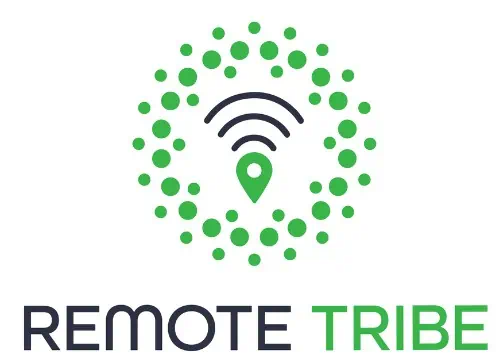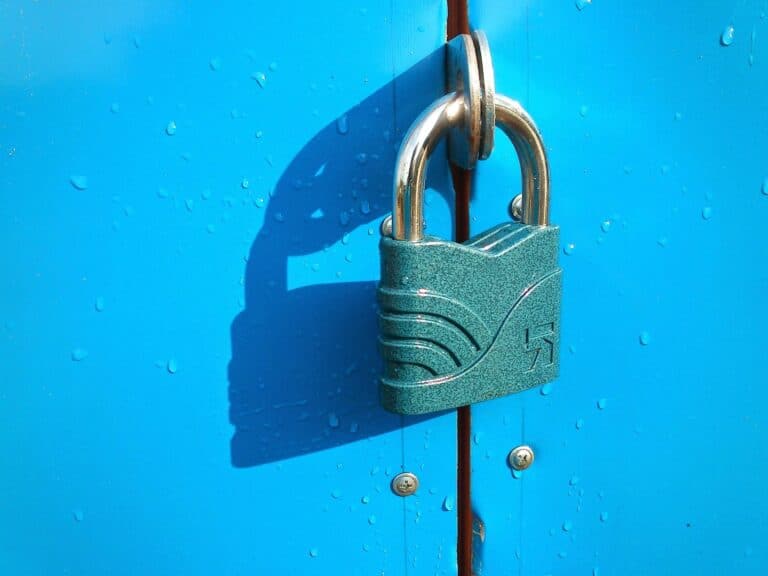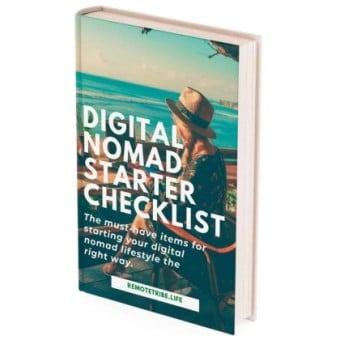The Ultimate Guide To Stress Free Travel – Planning And Avoiding Traps
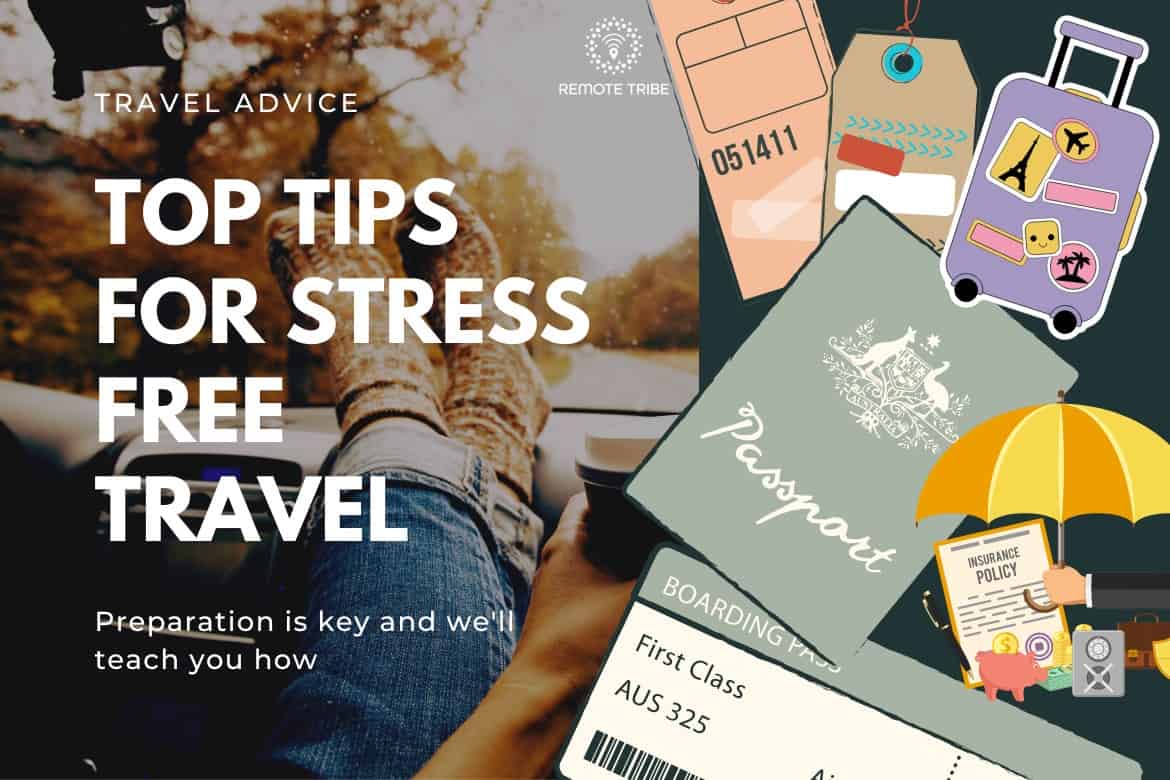
Sure, traveling can be a lot of fun. But it can also be pretty stressful – especially if you’re trying to juggle a million things at once or if you are traveling with family. (pss – solo travelers are luckier). However, if you’re looking for a way to make your next trip a little less hectic, stay tuned for the stress-free travel list below!
Yes, booking a hotel or flight might be easy, but the devil is in the details and they have the power to make a great trip or a hellish one– especially when you’ve been waiting for a looong time for one.
Not only that you need the right hotel at a good price, but also synchronize transport, gadgets to make your trip sweet, apps, and most possibly a huge list of “to-see-places”. This is when you need to start planning your trips, either as a digital nomad or solo traveler, but more so as a family with kids.
But don’t panic travelers: it can be done and we’ll teach you how to travel stress-free.
We’ve got tons of tips and tricks that will help you keep your sanity intact while on the road. So sit back, relax, and let us show you how it’s done!
Epic Tips For Stress-Free Travel
Long or short holiday, these following tips will help you have a more pleasant journey anywhere you go in the world. Remember, preparation is key so make sure you go through every each of these points and consider them whenever you go. Not only that they will save you time and nerves, but also some money.
1. Check your passport and visa
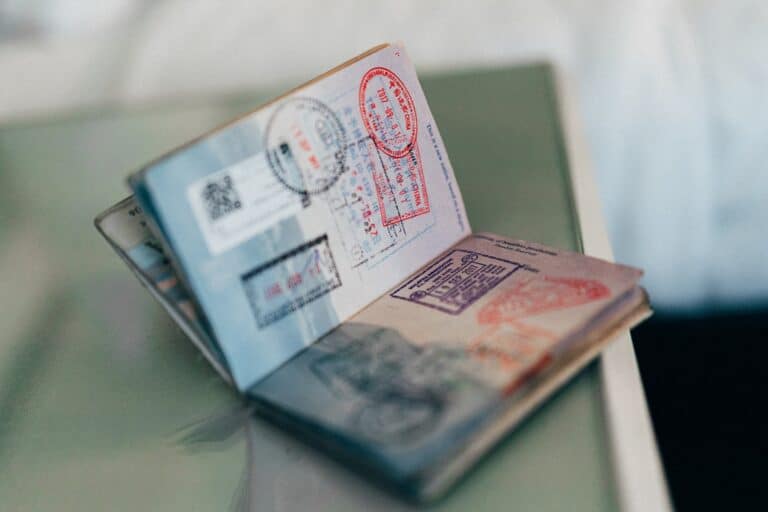
If you’re about to embark on a new adventure, there are plenty of things that need attention. First and foremost is checking the validity of your passport – some destinations require it not just to be valid during the trip but also six months after!
You may also need a visa. Depending on your nationality and where you’re traveling, you may also need to a stamp. Some countries offer visas on arrival but not all of them. Check with an embassy or consulate online before you go! Some countries also don’t allow multiple entries on a tourist visa, so if you go backpacking, make sure you have the right visas. Check out this website for more information on what visas you need for which countries.
2. Health Insurance Is Paramount
Being ill abroad can be stressful and even dangerous, but there are ways to reduce your risk. First, check with the embassy or public health website for the country you’re visiting to see if vaccinations are required. Vaccines are usually not expensive, and the ones against Hepatitis A and B, Tetanus, and Typhoid have been on the market for tens of years. In a lot of countries, they can be made in private clinics and they are relatively cheap.
Make sure all medications (including malaria tablets) will work in advance of travel at least six weeks prior; also bring along an insect repellant lotion that should protect against both mosquitos AND sand flies!
Don’t forget any prescription meds, along with your prescription for each to buy more at the destination if needed. If you have a medical condition or allergy that requires particular attention, bring along a doctor’s letter that describes the nature of the condition and the treatment needed.
3. Luggage and Travel accessories
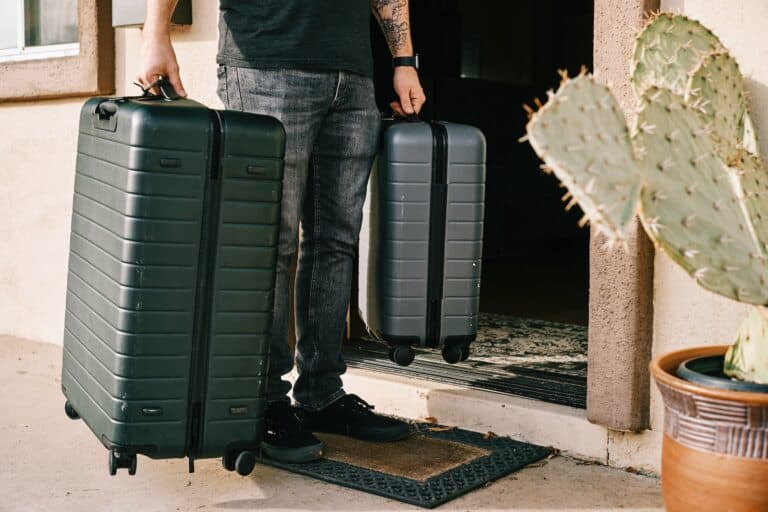
Long-haul flights can be a lot more bearable if you bring along a good trolley in the cabin where you can unpack essentials to make your flight more decent. Some low-cost airlines charge extra for the carry-on, so make sure you check the website and ticket type. Anyway, the cabin luggage should be practical, easy to open and solid because it will get thrown around.
Here are some ideas of items to Include in your carry-on for a stress-free flight and holiday: an eye mask, and noise cancellation – this way they’re not fighting against their natural sounds by land or air! Pack light but make sure everything essential is easily accessible
You’ll also need high protein items like chicken jerky; tons of water bottles have been shown as being important in staying hydrated during long journeys
Have a look at our travel gear reviews below
4. Budgeting
Money is a KEY aspect you cannot neglect. Try to set a budget for your trip or period in that country according to your savings and the credit cards you want to use. Make sure to include flights, hotels, and transfers to travel stress-free of course. Think of how much cash you want to take with you and how much you will spend by card. Make sure you don’t take too much cash with you.
This budget will be important for the trip details mentioned above and will determine the type of accommodation you can get and where you can afford to eat (street food or fancy restaurants?). Having a budget in mind will help you filter out the hotels and experiences you can’t afford and see what you will be able to get for your buck. We recommend you have a reserve of about 10% on top of the predicted expenses. for unexpected costs.
5. Locks and Trackers on Luggage and valuables
This is maybe the most “stress-free” gadget you can buy, so you don’t worry about losing things or even your luggage. The solution is a GPS-integrated key tracker that easily attaches to the bottom of any type and size set so you always know where they are at all times! The latest GPS trackers are usually pretty small, just a bit bigger than a coin. They are accurate and even make sounds to help you identify where your belongings are.
Apple Airtag is the most popular one, however, there are plenty of other good alternatives. You can see them here.
Small locks are another thing that will keep you safe, keep you out of trouble, and lower your stress. They will help you secure your luggage, sling bag or even locker in a hostel room. They are very portable and quite cheap, so don’t hesitate and have at least one in your bag. Here is a good list of solid travel locks.
6. Organise Cash and Cards - Exchange Cash and take international cards with you
To make life easier while traveling and save some money as well, it’s a good idea to always have local currency handy and you can either order ahead on this (ordering online may save money) or pick it up from ATM before going to the airport
On top of that, consider switching your currency exchange fee credit card (here is a great list for travel cards) for one without forex fees if necessary.
Here are some PRO TIPS to travel with cash stress-free
1). Make sure they’re well secured (look into a travel belt )
2 ) Keep the cards separated from each other and cards separate from cash
3) Split the cash too in different compartments of your luggage and carryons
7. Book hotels way in advance
You can hit two birds with one stone by booking your hotel or Airbnb in advance. You will remove the stress from the equation (which is what you always want) and number two you will get better prices.
It’s all very well going for a great hotel rate, but make sure you research it before booking. There’s no point paying less if you’re going to have to splurge on taxi fees every night. Where is your hotel about nearby restaurants and bars? What neighborhood is it in? Are you going to be able to walk around easily after dark? How will you get from A to B? Get on street view and gift yourself the knowledge. Do all this research, you won’t regret it.
8. Medicine and first aid kit
A first aid kit is an essential piece of equipment on any gap year or round-the-world adventure, but most travelers aren’t sure exactly what they need to take with them.
The best first aid kits are simple but varied and will have a variety of dressings and equipment to deal with the absolute basics. More importantly, they can be used with little or no training. Here are some things you should definitely have in your first aid kit:
- Basic First Aid Kit
- Travelling with Medication
- Medications
- Medical Alert Jewellery
- Water Purification
- Insect Bite Avoidance
- Sun Safety
9. "Life-Saving" Tech Gadgets
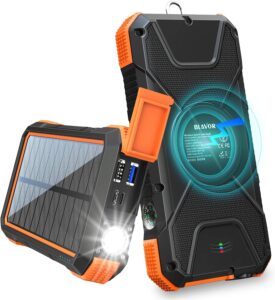
Compact Powerbank
A Power Bank is a portable charger designed to recharge your electronic devices when you're on the move. Ranging in size from slim, pocket-sized devices up to larger, higher-capacity Power Banks – they can be used to charge smartphones, tablets etc.

Noise cancelation headphones
The Sony WH-1000XM4 is one of the best noise canceling headphones on earth, and it just got better with its new design. The improved ANC means you'll be able to enjoy your music or podcasts even more than before!

Kindle
The Kindle is a small hand-held electronic device for reading books, which has been developed by online retailer Amazon. Rather than you downloading an iPod or MP3 player with music, you download books (via wireless technology) onto a Kindle and read them on it. The best part is that their battery does not need to be recharged frequently compared to and other gadgets. This makes them quite travel-friendly and of course your journey less stressful.
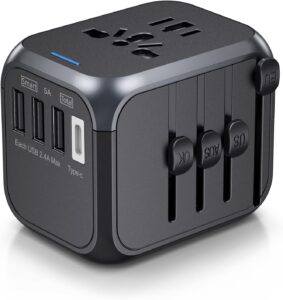
Plug converter
This International European Travel Plug Adapter comes with USA / Europe / UK / AUS plugs all in one design and a worldwide universal AC outlet which is applicable to more than 160 countries. Also, this Universal Adapter has 4 USB ports(1*USB-C) and Universal Socket to use, which meet the different needs for worldwide traveling. It is an indispensable travel accessory providing the best charging solution for a stress free trip.
10. Pack A Traveling Cot For Babies
Lorem ipsum dolor sit amet, consectetur adipiscing elit. Ut elit tellus, luctus nec ullamcorper mattis, pulvinar dapibus leo.
11. Have you travel apps Ready
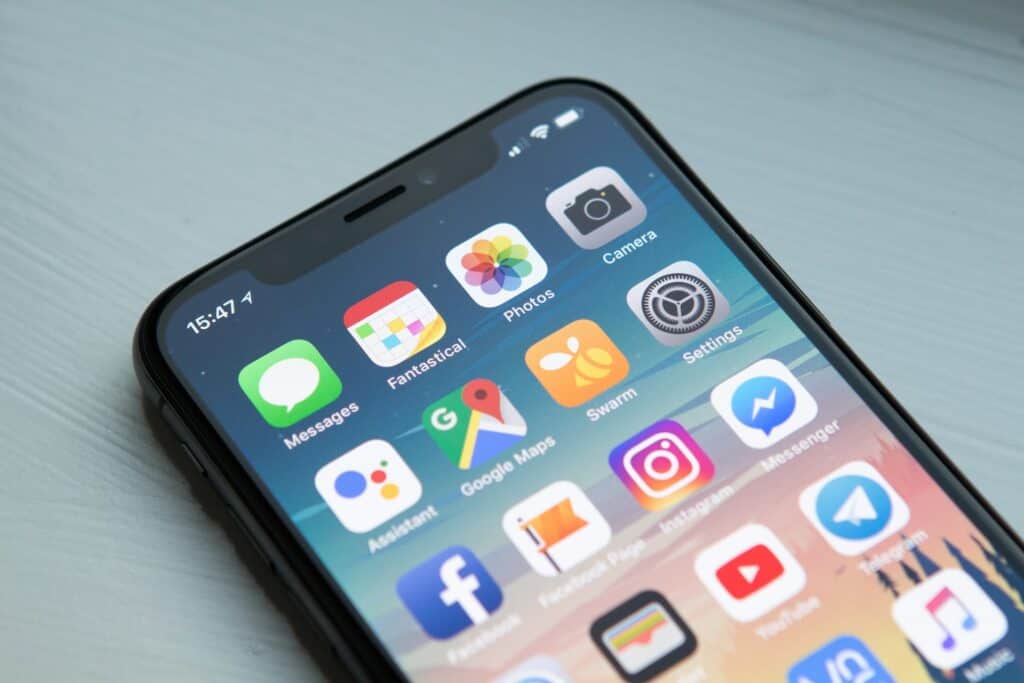
These apps will help you stay on top of your flight timings so that everything goes off without a hitch. The best part? You can use these online booking apps to have a customized interface and get personalized content depending on the place you are and even suggestions. So not only will you get reminders when it’s time to book seats or change itineraries but also visual cues like map animations showing where your next stop is or what’s the best restaurant in the area you’re in.
Not to mention booking taxis, experience and so much more. Some of the best apps we recommend are Airbnb, Uber, Bolt, Trip Advisor, Google Maps and Google Translate.
12. Pack light
The secret to stress-free travel planning is also about getting into the habit of packing light. This means not only doing your research on what you’ll need for each trip but also being mindful about how much space it’s going take up in your luggage and what kind of season clothing to take with you.
It’s also likely that, wherever you’re heading, you can buy anything you’ve forgotten on the ground, especially if you are traveling in cheaper countries. The bottom line is, overpacking usually comes down to indecision and uncertainty rather than need. So be ruthless, and whittle down your packing list to the absolute essentials. Bar your passport, it’s unlikely you’ll regret leaving anything behind. But a bulky, bloated backpack will drag you down for the duration of your trip. A great tip is to use packing cubes that will compress your clothes and other essentials a lot so you can travel more compact and stress-free. We covered the top packing cubes in an article here.
13. Leave valuable jewellery at home
If you have expensive jewelry, it’s best to leave that at home. You don’t want any trouble on the move because of your valuable items. People with bad intentions will notice if they see what looks like a gold ring or bracelet or an expensive watch, especially in poorer countries. Some couples even choose not to take wedding bands with them during their travel time either – if you are willing, one option is to replace them with cheaper rings whilst traveling which avoids issues later down the line. We know it’s a bit extreme, but it’s definitely an option if you don’t want to get “separated” from the loved one 🙂
14. Buy a local SIM Card
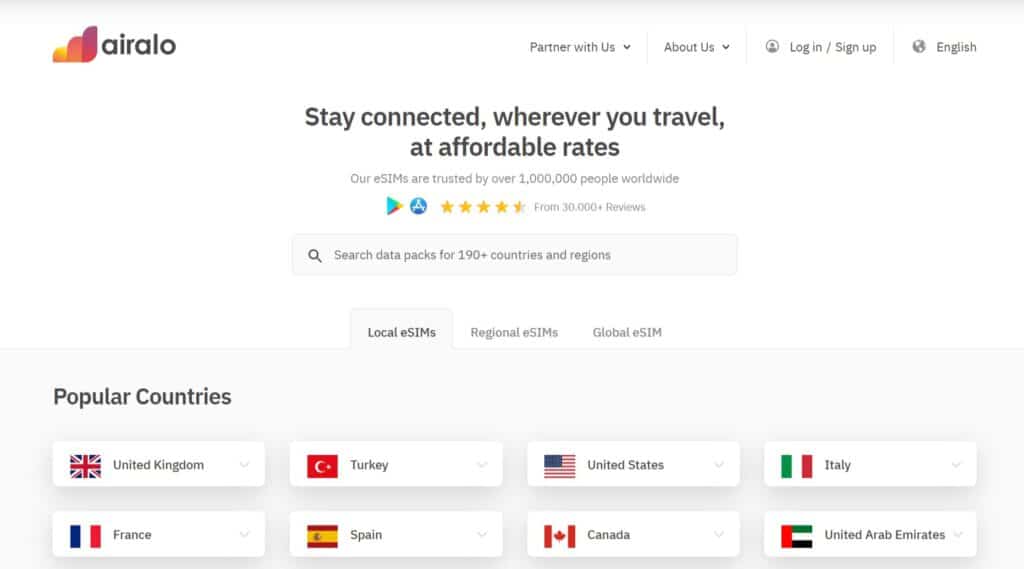
Roaming calls can be extremely, expensive and you might have felt it in the past. Why would you stress about that? Instead of being dependent on Wi-Fi spots, consider buying a local SIM from the country you will be traveling to.
Usually, you can buy a pre-paid SIM as soon as you arrive at the airport. where GSM carriers have offices throughout which will sell them inexpensively (just research what carrier has the cheapest rates). But there are even better news. Most of the modern smartphones have a functionality called e-SIM where you don’t need a physical sim to be inserted in your phone. It will work on the same phone, in parallel with your existing physical SIM. You can find e-SIM in a lot of countries these day and they are very easy to setup in your phone in a few steps. To find out more, check out one of the biggest e-SIM global providers on the market called Airalo.
15. Electronics, Flight and belongings Insurance
Travel insurance is a must for nervous travelers. It can be purchased through your credit card or on the booking site when you purchase airline tickets and vacation combo packages. Alternatively, you can buy solely the insurance from comparison websites like Moneysupermarket.com
If you go through an agency, the stress is less. They will either include it or give you the option to add it to the package!
Good travel insurance will also cover big health issues or accidents and return flights home in the case of a disaster. They usually cover lost baggage and trip cancellations as well.
This small investment protects all that matters from being lost/stolen during travel–valuable items are protected no matter where in the world you go.
16. Research the culture
if you are traveling to a destination for the first time, research what culture and atmosphere exist in that area. Culture shock can be very real, so it’s important not only know about local customs but also how those of other countries live their lives before arriving there! Also, Research “common scams” in your destination so you know what to look out for.
You don’t want to be stranded on the side of the road, with the rental broken window, and no wallet or phone.
Research customs like whether you should tip or not and how much, and if taxi cabs have meters or not. Do some reading about which areas of the city you should stay away from
17. Use Airport lounges
Airport lounges are everywhere and actually, they are more accessible now than ever. They can decrease your travel stress level immensely because of the confort the offer and other ammenities. The travelers who use are there on a perk from a great travel credit card. This is certainly an option if you are a frequent traveler and will give you access to travel insurance and upgrades as well. If not, then it probably isn’t worth the high yearly fee for you.
However, you can purchase a membership to specific lounges or a Priority Pass that lets you into a large number of lounges all over the world. Not only do lounges have free food and adult beverages, but they have better wifi, comfortable seating, and some even have showers and sleeping areas. In some airport lounges, you can even buy a day pass that won’t cost you any more than eating at one of those incredibly overpriced airport restaurants.
